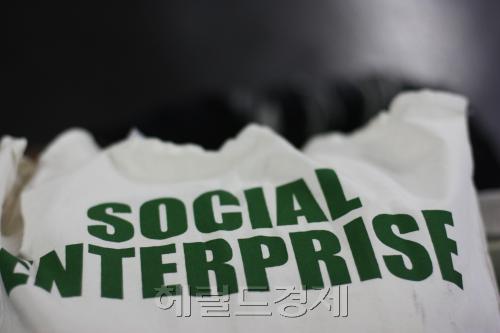|
[Social Enterprise News in Korea]
3. <Social Enterprise The First Social Enterprise Day on July 1, 2011
Source: Herald Media http://biz.heraldm.com/common/Detail.jsp?newsMLId=20110630000024
“Social enterprise is an astonishing achievement in which the impossible becomes possible.” (Bill Gates, the founder of Microsoft) “Social enterprise is a successful new business model.” (Gordon Brown, Prime Minister of the United Kingdom) “The power of economy now moves toward civil society. It’s time for social enterprises to move into the mainstream.” (Oxford Skoll Forum Declaration) While criticism on neo-liberalism has been raised, futurologists are now focusing on ‘social enterprise’ containing the value of share and care. As seen from the slogan ‘Enterprises don’t hire people for selling bread, but sell bread for hiring people’, social enterprises creating jobs for the low income class are ready to be the driving force of the economy. The Council for Future and Vision diagnoses that social enterprise is the real identity of capitalism in the sense that the pursuit of profit and the valuing of sharing, caring and donating are harmonized within it. Some economists see social enterprise as a big shift in economic power to consumers who become producers. It is the system in which people get the opportunity to work through the support of major companies and social welfare organizations, and the profit goes to the marginalized or to reinvestment in new businesses. The outcome of production or business goes to everyone, not to just a person. The value creating effect is 278% more in social enterprises compared to direct government support. It is a ‘warm blue ocean’ in which the priming water of donation and support pumps up bigger social profits. It might be the 21st century version of the ‘creative destruction’ of capitalism, as addressed by J. Schumpeter.
Two hundred years of experience with guilds (a kind of business association) has been the foundation of the success of social enterprises in England, one of the most vigorous countries when it comes to supporting social enterprises. There are around 60,000 social enterprises in England and their total sales reach KRW 50 trillion (approx. USD 50 billion). England was also much faster than other European governments to support and promote social enterprises. The Promote Act was passed 20 years ago in some European countries.
There are many successful stories of social enterprises and episodes of rehabilitation: Saetomin found hope with the income generated from wrapping boxes; ex-convicts could start a new life after learning sewing skills; and the disabled touched audiences by playing music. Along with the spread of successful stories and donations, rapid growth of the social enterprise sector is expected, considering the Korean trait of giving their full attention to trendy issues. A Korean government agency, the Presidential Council for Future and Vision, said that social enterprises, contributing to creating new national wealth and social unification, reducing the poverty gap, and creating balanced development, will be expanded up to 5,000 by 2020. The council also added that it would provide institutional strategies to prevent local governments from irrationally increasing the number of social enterprises and to prevent social enterprises from simply depending on government policies. A Ministry of Employment and Labor affiliated organization, the Korea Social Enterprise Promotion Agency, said that it would increase the number of reports on transparency in management and start an overall survey on the real condition of social enterprises. The Social Enterprise Promotion Act, recently published by the government and the Promotion Agency, contains the expansion of loans, a priority on the procurement of public organizations, extra points on goods bidding, exclusion from the Fair Trade Act when companies directly establish a social enterprise, and the offering of accounting and business management programs. The government and the Promotion Agency held the First Social Enterprise Day event at the Korea Press Center and Seoul Square on July 1, 2011 from 2 pm to 7pm. Before the event, a ‘Changing the World’ concert was held at Gwanghwamoon in Seoul on June 28 and 29 under the theme of ‘sharing, challenge and venture spirit’. Ventures are underway once again, but many people hope that things are done differently this time than they were 10 years ago. Translated: by CHOI Eun-young, JANG Gyeong-ah Edited: by Patrick Ferraro, Marie LEE |


